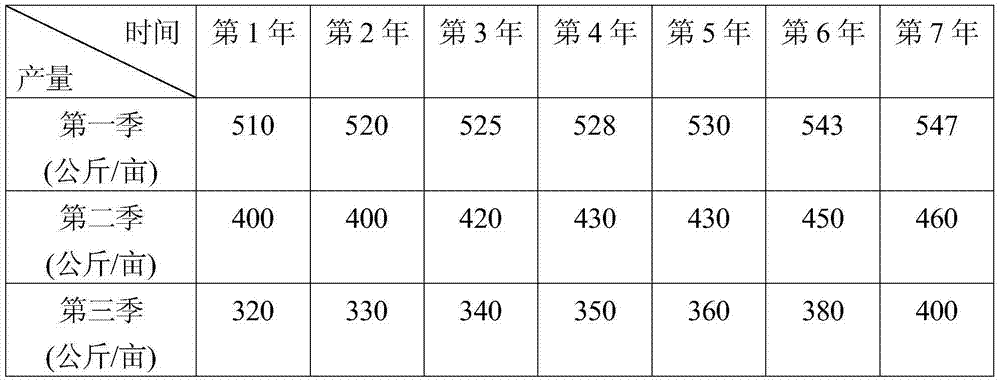Cultivating method and seedling planting method of cross-year regrowing rice seeds
A technology of rice seeds and breeding methods, applied in the fields of rice cultivation, botany equipment and methods, angiosperms/flowering plants, etc., which can solve the problems of failure to complete in time, low economic benefits, high labor intensity, etc., and achieve lodging resistance Strong, improve economic efficiency, reduce labor intensity
- Summary
- Abstract
- Description
- Claims
- Application Information
AI Technical Summary
Problems solved by technology
Method used
Image
Examples
Embodiment 1
[0030] The cultivation of embodiment 1 Yue Nian regenerated rice seed
[0031] (1) Choose a large fertile field with a leeward sun and a water source guarantee, use wild rice with genes for cold resistance and developed root system as the male parent, grow seedlings with plastic film at a temperature above 15°C, and apply sufficient base fertilizer; transplant wild rice when the five leaves are one heart Form a large row with a width of 1.2 meters, one plant per nest, and the distance between rows (withdrawal from the nest) is 7 to 8 inches;
[0032] (2) One month after the wild rice described in step (1) is transplanted, the DS89-1 glutinous rice is used as the female parent, and the plastic film is removed when the seedlings are grown with conventional plastic film to two leaves and one heart;
[0033] (3) When the DS89-1 glutinous rice seedlings grow to five leaves and one heart, they are transplanted between the large rows described in step (1), wherein two small rows of D...
Embodiment 2 1
[0037] Seedling cultivation and planting of rice seed regenerated in one cropping rice area in embodiment 2
[0038] (1) Choose more than 60 mu in Maguan Town, Zhongxian County, Chongqing as the experimental site, and rice will be produced for one season. The regenerated paddy rice seeds cultivated in Example 1 are raised in the middle of March according to the conventional mulch film, and the mulch film is removed when the two leaves are one heart, and the five leaves are transplanted to the field in time, and planted into a wide row of 13 to 17 inches, and a narrow row of 6 to 5 inches. 7 inches, the distance between rows (withdrawing nests) is 6-7 inches, and before transplanting, apply enough base fertilizer to the field, mainly organic fertilizer, and do not apply top dressing;
[0039] (2) It is strictly forbidden to irrigate deep water during the whole growth period, and manage and fertilize according to the routine; rice is fully ripe at the end of August and early Sep...
Embodiment 3
[0045] Seedling cultivation and planting of regenerated paddy rice seeds in the two-cropping rice area of embodiment 3
[0046] (1) More than 80 mu were selected in Chenzhou, Hunan Province as a test site, and rice was produced for two seasons. The regenerated paddy rice seeds cultivated in Example 1 are raised in conventional mulch in mid-February, and the mulch is peeled off when two leaves are in one heart, and they are transplanted to the field in time when the five leaves are planted. inches, the distance between rows (withdrawing nests) is 6-7 inches, and before transplanting, apply sufficient base fertilizer to the field, mainly organic fertilizer, and do not apply topdressing fertilizer;
[0047] (2) It is strictly forbidden to irrigate deep water during the whole growth period, and manage and fertilize according to the routine; at the end of July, the first season of rice is harvested when it is fully ripe, and the rice pile is kept at 18-25cm, and it is managed and...
PUM
 Login to View More
Login to View More Abstract
Description
Claims
Application Information
 Login to View More
Login to View More - R&D
- Intellectual Property
- Life Sciences
- Materials
- Tech Scout
- Unparalleled Data Quality
- Higher Quality Content
- 60% Fewer Hallucinations
Browse by: Latest US Patents, China's latest patents, Technical Efficacy Thesaurus, Application Domain, Technology Topic, Popular Technical Reports.
© 2025 PatSnap. All rights reserved.Legal|Privacy policy|Modern Slavery Act Transparency Statement|Sitemap|About US| Contact US: help@patsnap.com



